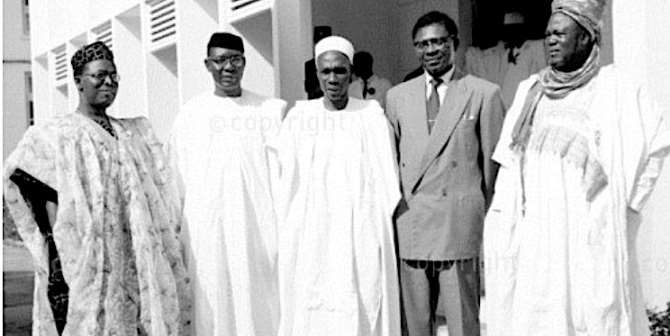Nigeria At 62: The Labour Of Our Heroes Past

“the labour of our heroes past, shall never be in vain” reads the fifth and sixth lines of the Nigerian national anthem. These words serve as poetic tributes made to the various individuals who sacrificed several fundamental rights, ranging from freedom to life, to ensure that the citizens of the territory which is presently known as Nigerian were given their rights of self-rule and self-determination.
Pre-colonial Nigeria comprised of numerous diversified tribes which had unique systems of governance based on the different ethnic groups that occupied the now-confluenced territories. The political (traditional) system spanned from imperialism in the northern areas to monarchial rule in the south (and west) and chiefdoms in the eastern region. The 1884/85 Berlin Conference heralded the invasion and colonization of Western Africa by European nations (and empires). The British Empire was granted international claims to several territories in the region; one of which was Nigeria.
Upon colonization, in 1885, the southern geographic area (comprising of the western, eastern and southern regions) was referred to as the Southern Nigeria Protectorate while the northern geographic area was referred to as the Northern Nigeria Protectorate. They were governed by high commissioners/governors, who reported to the British monarchy and government. In 1914, the protectorates were amalgamated to become the Colony and Protectorate of Nigeria and began to be indirectly ruled by governor-general; of which Sir Frederick Lugard who oversaw the amalgamation was the first. Policies of governance, which spanned social, political and economic, were imposed based on directives from the British monarchy and government; with little or no say given to the locals.
Resistance to the imposition of the various policies of colonial rule was usually met by brute force by the British imperialist forces. Nevertheless, this didn’t deter several individuals who gave up their freedom and lives in the fight of ensuring that the fundamental rights were given to the locals. The early resistance led to the exiling of several traditional leaders and chiefs. The introduction of European education to few citizens of the then British colony saw an incorporation of intellectualism into the local Nigerian society. This gave a transformation of the anti-colonial resistance into organized nationalist movements; championed by young visionaries.
The nationalist movement had on its cause organisations such as the Nigerian Youth Movement (NYM), National Congress of British West Africa (NCBWA), among others. The Second World War (WWII) helped the nationalist cause; as the impact of the war exposed the cons of imperialist-like territorial expansions. The high cost of maintaining the various sectors in the colonies also aided the cause. Pressure from global nationalist movements also led to drafting of international constitutional reform charters such as the Atlantic Charter in 1941, Declaration by the United Nations in 1942, and the United Nations (UN) Charter in 1945.
Nigerian independence leaders
Individuals who participated in the struggle for Nigeria’s independence include but are not limited to:
• Herbert Macaulay: Regarded as the father of Nigerian nationalism, he was a key figure in the self-rule cause. He founded the Nigerian National Democratic Party (NNDP); which was the first indigenous political party to sit in the then legislative council. The party later joined forces with the Nigerian Youth Movement (NYM) to form the National Council of Nigeria and the Cameroons (NCNC); a key force in advocating for Nigeria’s independence.
• Eyo Ita: Founder of the Nigerian Youth Movement (NYM). The group was the first official nationalist organization in the country and galvanized the Nigerian youths in the nationalism cause. Its cannons centered on nationalism and inter-tribal unity.
• Ahmadu Bello: A Sardauna (Sultan) of Sokoto, alongside Tafawa Balewa, he was instrumental in the transformation of the Jam’iyyar Mutanen Arewa cultural group into the Northern People’s Congress (NPC) political party. He led the party and was the premier of the northern region from 1954 to 1966; when he was assassinated during the first coup.
• Nnamdi Azikiwe: Co-founder of the National Council of Nigeria and the Cameroons (NCNC). He opposed the constitutional provisions of then governor-general Arthur Richards; which allowed an increase in the number of nominated African members to the Legislative Council and only elected members. The loyalty of nominated African members was usually to the colonial government. He later served as the first Nigerian governor-general in 1960 and President in 1963.
• Obafemi Awolowo: The country foremost federalist, he advocated for federalism for equitable national integration and harmony. He championed the cause of economic and social development in the western region. He served as the first premier of the western region; during which he introduced the free education program in the region.
• Tafawa Balewa: An advocate for the rights of Northern Nigeria. He was instrumental in the transformation of the Jam’iyyar Mutanen Arewa cultural group into the Northern People’s Congress (NPC) political party. He served as the first Prime Minister of Nigeria following independence before his overthrow and murder during the first coup.
• Anthony Enahoro: A formidable politician. He was the first lawmaker to move the motion for Nigeria’s independence in the parliament in 1953.
• King Jaja of Opobo: Rising from a slave boy to a decorated king, he refused to adhere to the British imposed trading policies and taxed the imperialist traders and merchants who conducted business in his territory. This angered the imperialists who arrested and exiled him. When finally allowed to return home, he was allegedly poisoned by British seamen on the island of Tenerife.
• King Koko of Nembe: The Amanyanabo (King) of Nembe Brass (in present-day state of Bayelsa), he resisted the monopolistic trading treaty of the Royal Niger Company and raided the company’s headquarters in the area; citing attacks on his people. This led to a reprisal attack by the British naval forces who sacked his capital causing him to flee to exile. He eventually died in a suspected suicide.
• Funmilayo Ransome-Kuti: A formidable political force, nationalist and feminist, she was instrumental in the establishment of the Abeokuta Ladies Union which morphed into the Abeokuta Women’s Union (AWU); with its prime objective including fight against unfair price controls and taxes imposed on market women. She spearheaded the revolt against the tax impositions of a local monarch Alake Ademola II; a proxy of the British government. She was the propagator for the creation of the Nigerian Women's Union (NWU); which was established to better support women's rights and enfranchisement across the country. She was the sole female in the political delegation sent to London to oppose the constitutional provisions of then governor-general Arthur Richards. She was nicknamed the ‘Lioness of Lisabi’.
• Margaret Ekpo: A women’s rights activist, nationalist and pioneer Nigerian female politician, she fought against the discriminatory and oppressive political and civil role colonialism played in the subjugation of women to ensure that women were given a voice in political and civil matters.
• Oyinkasola Abayomi: A nationalist and feminist, she founded the Nigerian Women’s Party; which sought for equal rights for Nigerian women.
• Mbonu Ojike: Referred to as the ‘Boycott King’, his brand of nationalism was tagged as Africanisation; which constituted a persistent consumption of African forms of cloths, food, dress, religion and dances while also believing in the selective benefits of foreign amenities. Alongside fellow Nigerian Kingsley Ozumba Mbadiwe and Sierra Leonean John Karefa-Smart, he established the African Students Association of the United States and Canada; among whose objective was the welfare of African students and the interpretation of African culture to a western audience.
• Kingsley Ozumba Mbadiwe: A nationalist and astute politician, he was instrumental in the establishment of the African Students Association of the United States and Canada whose objective was the welfare of African students and the interpretation of African culture to a western audience.
These men and women played very vital roles in ensuring that Nigeria was granted the rights to self-rule and self-determination; as enshrined in the UN Charter of 1945. They sacrificed their rights and privileges for the cause of Nigeria’s independence. Every time the national anthem is played is a reaffirmation to their memories that the struggles and battles they had to encounter and endure was not in futility.
Happy Independence Day/New Month to all Nigerians nationwide and in diaspora.
God bless the Federal Republic of Nigeria!
Article by Agwah Michael, (Founder 247NewsUpdate Blog, Researcher, Human Rights Activist, Social Critic and Political Analyst) Twitter: @AgwahMichael LinkedIn: Agwah Michael

